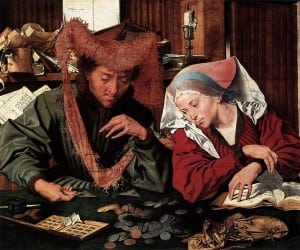Does anything demand more attention than money? Eyes, hands, shoulders and elbows all gravitate towards a pile of coins. But the money-changers are no longer grotesques; the wife is as pretty as she is rapt. Nothing is more ordinary, the painter acknowledges, than our relating to one another through money. Above and between their intent faces, the candle has gone out.
Cosa esige più attenzione dei soldi? Occhi, mani, spalle e gomiti sono tutti orientati verso un mucchio di monete. Ma i cambiavalute non sono più grotteschi; la moglie è tanto bella quanto assorta. Non v’è cosa più ordinaria, attesta l’artista, del nostro relazionarci agli altri tramite il denaro. Le mani sono tese e avide. In mezzo all’uomo e alla moglie, la candela si è spenta.

